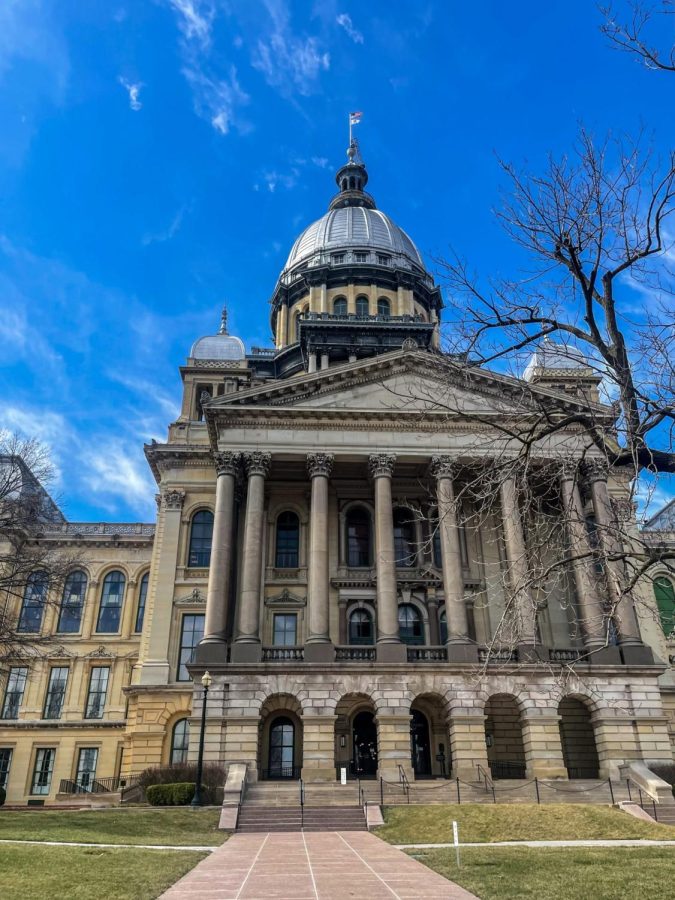Illinois Senate works towards cannabis reform, equity concerns remain
In 2022, the state of Illinois grossed close to $445 million from sales of cannabis.
Recent legislation coming from the Illinois Senate is a reflection of efforts to further reform cannabis use and possession in the state, while a haunting history of the War on Drugs still looms in marginalized communities.
Senate bill 125 and 1886 are both pieces of legislation working to establish a more progressive approach to cannabis in Illinois.
Senate bill 125 would prevent police from conducting searches on vehicles on the sole basis of the smell of cannabis.
“People, especially people of color, are unnecessarily pulled over way too often,” said Rachel Ventura (Party-District) during debate regarding these bills.
2021 traffic stop data from the ACLU reveals that Black drivers were 1.7 times more likely to be stopped by police than white drivers in Illinois.
“Historically, Chicago is one of those places where there has been over policing,” said Don Opitz, director of the cannabis studies minor at DePaul. “There is no coincidence that Illinois arrest rates of possession are higher than the national average.”
The ACLU also rules that Black people are 7.5 times more likely to be arrested for marijuana possession in Illinois, indicating that widespread legalization of cannabis in 2019 did not automatically erase the inequity that surrounds the substance for marginalized communities.
“I think that this kind of legislation is particularly relevant for major cities like Chicago, where there is still a struggle to reform police practices that disproportionately affect Black and brown communities,” Opitz said.
Peter Contos, Deputy Director of the Cannabis Equity Commission of Illinois and DePaul alumni, voiced his organization’s support of these two bills, but believed they should have occurred alongside the initial widespread legalization of cannabis.
“Frankly, these are things that should have happened in 2020,” Contos said. “To us, first and foremost, we have to make sure that the criminal legal system is updated to reflect that [cannabis] is actually legalized.”
Contos believes that Senate bill 125 is a step in the right direction in ensuring a complete legalization of cannabis in every aspect.
Xavier Perez, a professor of criminology at DePaul, is warry to quickly establishing these bills as a win for equity on a larger scale.
“These bills are steps in the right direction, but it’s incredible to think how these minor laws are going to change policy that has decimated working class communities of color for decades,” Perez said.
Perez also worries that despite these new laws, police practices will largely remain the same.
“I don’t know to what effect these laws change police practices,” he said. “It’s not dealing with the sort of institutional racism that we have, which has a premise in social control.”
The second bill awaiting approval from the House allows for those on probation to have the freedom to consume cannabis and alcohol without repercussion.
Senate bill 1886 includes a series of exemptions for those under 21, and for those who had “the presence of an intoxicating compound in the person’s body,” as an aspect of their offense, according to the Illinois Senate.
“We don’t want anyone to go all the way back to square one just because they smoked a joint,” Contos said. “We’re super excited that [Senate bill 1886] is going to reduce some of the harm that people face when they come home.”
Perez notes that life for formerly incarcerated people requires deeper legislation which transcends past what Perez characterizes as the symptoms, instead of the causes of these issues.
“I like to address causes…a principal cause of crime is poverty, if we don’t address poverty then all we’re doing is addressing symptoms,” Perez said.
As indicated, a widespread equitable and intersectional environment surrounding cannabis does not stop with this legislation.
“There is a very small portion of dispensaries and craft grown businesses which are owned by Black/Brown people,” said Opitz. “When there is more representation in the business, there is more opportunity for change.”
The cannabis industry in Illinois accumulates millions of dollars annually, with Illinois grossing $445 million from cannabis in 2022, but discrepancies are seen in how this large sum of money is allocated.
“The reality is that wealthy white [people] own the majority of cannabis dispensaries,” Perez said.
Out of the $670 million which came out of cannabis revenue in Illinois in 2021, a large majority of this share was allocated solely towards white men, according to NPR.
“This whole thing has been a complete dumpster fire, this is the American story in one microcosm,” Contos said. “You have the government with no justification other than racism, criminalizing millions of people across Illinois and the United States, once they realize there is money to be made on this, for the state and a handful of their friends, it is palpable for them to legalize.”
Both Opitz and Contos are calling upon college students to mobilize and educate themselves about cannabis equity, in Illinois and across the country.
“I think it’s important for universities to be a part of this conversation,” Opitz said.
“I would just ask people to get involved… call your lawmakers, whether it’s supporting cannabis legislation or something else… the more support we have the quicker we can get work done,” Contos said.











